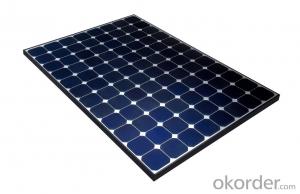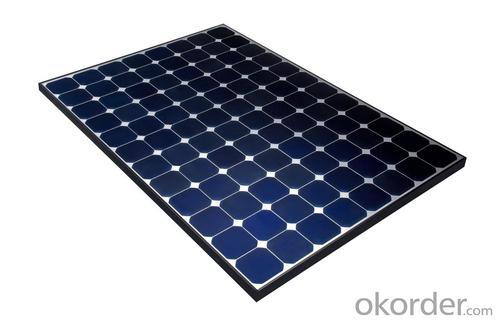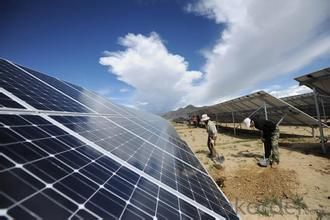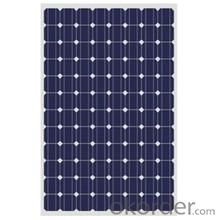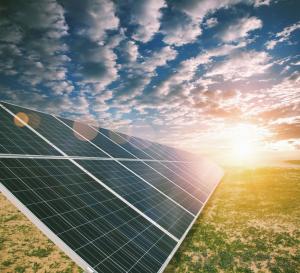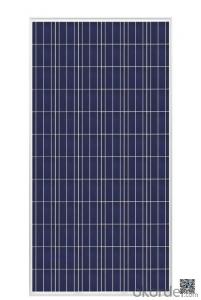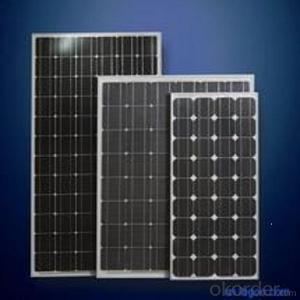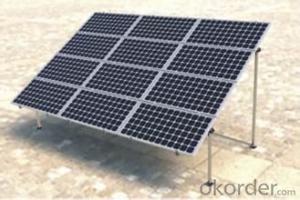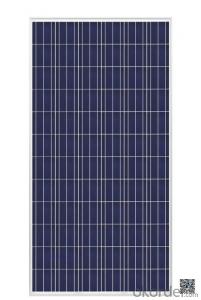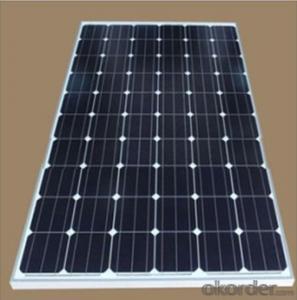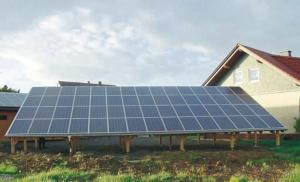Solar Panels on Home - Poly Solar Module China Bulk Price Superior Quality
- Loading Port:
- Shanghai
- Payment Terms:
- TT OR LC
- Min Order Qty:
- 500 watt
- Supply Capability:
- 50000 watt/month
OKorder Service Pledge
OKorder Financial Service
You Might Also Like
China Bulk Price Superior Quality Poly Solar Module
Introduction
this is a kit using for factory and storge field. this product is a higer output version with stable power and we gurantee you for 20years.
suggestied application
home lighting business lighting,
Garden lighting, pavement lighting
Farmer household lighting
Decorative water pump
Traffic signal lighting
industry area
business area
Solar Power Plant, Solar House
Product features
The modules are made of Monocrystalline or Polycrystalline Silicon cell.
Materials and color of the solar panel frame: Clear anodized aluminum alloy type 6063T5 Universal frame; Silver-white color;
The output connection gathers the coupling: Selects conforms to the IEC-612615; 2005, class II, IEC61730 international standard; Airtight waterproofing binding clamp;
Module seal structure: The surface is thick, the high diaphanous rate armored glass with solar cell board special-purpose 3.2mm becomes after the high temperature lamination craft. The back selects has waterproof and anti- aged performance fine TPT materials. The entire block battery board has, the waterproofing, the anti- aging airtight and so on the fine performance;
Power tolerance: +/-3%
The module bears the outside striking potential [V]: 1000V/1min
Working temperature: -40°C~+85°C
Service life [year]: It can be used more than 25 years under the environment of without acid, alkali and so on .
packing
Details: packed in international standard cartons(according to the requirements of customers ) for solar panels
Parameter
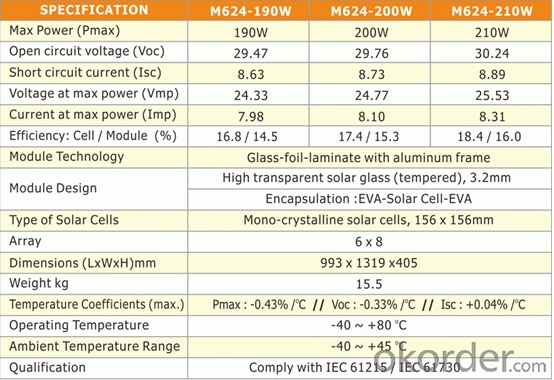
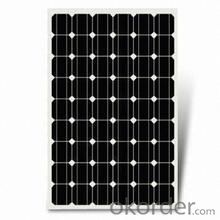
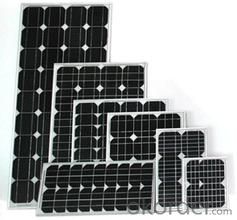
- Q: I need to be able to charge a 2v 7amp battery with a solar panel. I understand that the charge controller will keep the battery from over charging/discharging, but what I don't understand is the amps.The solar panel is rated at 5watts.The solar panel comes with a 2v 3amp charge controller but will I need to buy a 7amp charge controller and replace it with that for my battery pack? Please explain. Thanks in advance.
- If it is a charge controller that is wired between the panel and the battery only, then a 3A rating is ample. The controller only has to handle the maximum current that the solar panel can output. The panel will have (or needs to have) an open-circuit voltage that is greater than about 4V in order to actually charge the battery, whose terminal voltage will rise above 2V as it charges. The panel's open circuit output voltage typically is about 7V. The 5W rating is at the maximum power point under the illumination of standard sun and at a specified temperature. That maximum power point probably is around 4V, which means the panel will deliver the following amperage to charge the battery: I = P/V = 5W/4V = 0.36A Since 0.36A is well below the 3A rating of the controller, the controller will not be overloaded when charging the battery. Some charge controllers also have terminals for connecting the load that you want to power. If that's the case, then the controller also needs to be rated to handle that load amperage or higher. If you were to connect a 6A load, then you would like to have say a 0A controller. Hope that helps.
- Q: what do I need to do to disconnect a solar panel from a battery to protect the panel?
- Know that solar panels almost always incorporate a blocking diode to prevent a battery from back-feeding through an un-illuminated panel. Know that solar panels are usually connected to a battery via an electronic switching charge controller, not directly connected. Know that when a solar panel is open-circuited (disconnected from everything) it's terminal voltage will rise to almost twice it's nominal voltage. (22V is common for a 2V panel), unless it is stored in total darkness.
- Q: Can solar panels be installed on walls?
- Yes, solar panels can be installed on walls. Wall-mounted solar panels are known as solar wall systems, and they are a viable option for generating electricity from the sun. These panels are typically installed vertically on the sides of buildings or other structures, allowing for efficient use of space.
- Q: i attached a usb charger to my solar panel(it has an output of about .2 volts) but i read on my multimeter its only using about 8 volts however on the conventional wall charger that i use to charge it has an output of about 5. volts.... i believe that my mp3 player is not charging it does not display the charging icon when it is on or off ....is this becuase the output is higher ? do i need to install a volt dropping diode to prevent it from putting to much energy at once? (my mp3 charges fine on the wall charger but does not seem to respond to the solar panel so it the circuits are fine....)
- You description is not clear as to what is supplying and what is consuming the .2, 8, and 5. volts you mention. I get that your solar panel output is .2 VDC (volts DC), but is that open circuit or under load? Also, is the charger output AC or DC? What's using 8 volts? Circuits don't selectively use a portion of the voltage supplied. They use all or nothing. Is the polarity correct from your solar panel to your MP3 player? If your MP3 player requires DC for charging and you're feeding it the correct polarity, but too high a voltage, an overvoltage protection circuit in your MP3 charging circuit might be blocking the charging current from your solar panel. Go through everything again and if you need to post another question on YA, be specific as to what you're measuring, where, and whether it's the source or load you're measuring.
- Q: Can solar panels be used on boats or marine applications?
- Yes, solar panels can be used on boats or marine applications. They are a popular and effective source of renewable energy for powering various systems on boats, such as lights, navigation equipment, and even charging batteries. Solar panels are lightweight, durable, and designed to withstand harsh marine environments, making them suitable for use on boats and other marine applications.
- Q: Can solar panels be installed on a hotel or hospitality facility?
- Yes, solar panels can be installed on a hotel or hospitality facility. In fact, many hotels and hospitality facilities are adopting solar energy as a sustainable and cost-effective solution. Solar panels can be installed on the rooftops, parking lots, or any available open space to generate clean and renewable energy for the facility's electricity needs. This not only reduces the carbon footprint but also helps in saving on energy bills in the long run.
- Q: The colder a solar panel gets the more efficient it seems to be. As the panel warms, it loses some efficiency. Why is this so? Please explain in a way you would expect a high school kid to understand it, as I am a high-schooler and i have to explain this to other high-schoolers.
- For water heater type of solar panel the hot panel has more radiation losses reducing the heat available to be transferred to the water. In PV panels it has got to be characteristics of the PV cells. If the conversion efficiency drops with temperature rise then only this can happen. PV=photo-voltaic
- Q: The inverter I am using gets the required 2 DC volts from the solar panel, but fo some reason it just won't output the 0 AC voltage. When the inverter is hooked to a car battery, it works just fine off the same 2 DC rating. Help me out please...
- There could be a couple of reasons why it isn't working. First, 2V panels actually put out a considerably higher voltage because it is presumed that they will be used to charge a 2Vdc battery. That requires applying a voltage greater than 2Vdc, and usually there is a solar controller that regulates the solar power to the battery. It also has a voltage drop. Look at the first reference reference, and you will see these values for a particular panel: Voc: 2.6V (open circuit voltage) Vmp: 7.2V (voltage at maximum power point) Voc is the voltage the panel produces under standard sunlight and temperature conditions (25°C), with no load applied. As load is applied, the voltage drops (see reference 2). Power is the product of current times voltage, so at one set of conditions (namely at Vmp) maximum power is available from the panel. Your inverter might not be working for either of two reasons: ) it has input protection circuitry that locks out operation when it senses an overvoltage, as in the 2.6V open circuit voltage, or 2) the panel does not produce enough current and the voltage from the panel collapses under excessive load. For example, if you load your inverter to 20W, then nominally the 2VDC input to the inverter must supply 20W/2V/eff = 0A/eff Assuming the inverter has an efficiency of 80%, the input current required is: 0A/.8 = 2.5A A solar panel operating at maximum power would need a rating of about: 2.5A x 7.2V = 25W Is your panel that big? The other option, as mentioned by others, is to charge a battery that runs the inverter. Other nuances: Voc increases as temperature decreases. Sunlight intensity varies (obviously), so the panel may produce less than rated power. The power specifications often are printed on the back side of the panel.
- Q: I live in Hawaii and having a solar panel is not a bad idea since we have plenty of sun the only problem is that it cost a lot of money and takes many years before you get your money back. There are kits available where you can make and install your own solar panel and wind turbine but is it bull **** or is it a good deal?
- In my opinion, it is a losing equation. They will wear out and go bad long before you break even with your investment. The technology isn't there yet for the average homeowner. Save energy costs using other methods.
- Q: Well, I am looking for a cheap way on building a solar panel, instead of buying by the manufacturing stores. I would like to stay in the budget up to ,000 dollars. I want to have Solar Energy for my house because the sun is always shining. Is there a way I can make the Light power some of my house? What would I need? How much time would it take?Where can I get the items I need?
- The panels themselves- no. Minimal. For most it is just hosing them off with water as needed to remove dust. Battereis on the other hand are usually needing attention every week to maintain the electrolyte levels. The exception being AGM types. Periodic desulphating may be needed on older setups, but beyond that keeping chickens are more demanding. Batteries are how you store your energy for periods when demand exceeds what the panels can deliver, and at night. How many varies. Factors of how you use energy has most impact. Some people can get by with a few hundred Watts, for others 3 to 5 Kilowatts are needed. For the average American, 5 to 7 Kilowatts as a minimum without some serious changes to how energy is used.
Send your message to us
Solar Panels on Home - Poly Solar Module China Bulk Price Superior Quality
- Loading Port:
- Shanghai
- Payment Terms:
- TT OR LC
- Min Order Qty:
- 500 watt
- Supply Capability:
- 50000 watt/month
OKorder Service Pledge
OKorder Financial Service
Similar products
Hot products
Hot Searches
Related keywords
